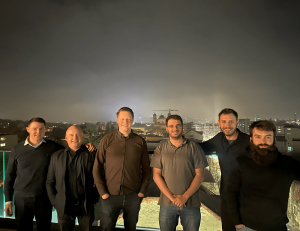AI-powered coding assistants are rapidly becoming a staple in modern software development, but how well do they perform in real-world environments? Tools like GitHub, Copilot, Cursor, and Windsurf are streamlining code generation, error handling, and documentation, and are increasingly embedded in developer workflows. Yet, with all the hype, it’s worth asking: are these tools truly ready for enterprise-level software development?
At Code4Nord, we’ve tested and deployed these assistants in practical development settings and collaborated with teams integrating them into broader engineering processes. The results are promising—but nuanced. While AI can improve productivity and reduce routine effort, the role of the skilled developer remains critical to every successful project.
Here’s what we’ve learned about the capabilities and limitations of the top players in this space, and what that means for the future of intelligent software engineering.
What Are Coding Assistants?
AI coding assistants are tools powered by large language models (LLMs) trained on vast datasets of code, documentation, and development best practices. Their primary function is to help developers write, debug, and optimise code more efficiently. Many of these tools now support multi-language environments, IDE integration, and even natural language queries.
Three of the most widely used assistants today are:
- GitHub Copilot – Backed by OpenAI’s Codex model, it integrates seamlessly with Visual Studio Code and GitHub workflows.
- Cursor – A variant of VS Code with native GPT-4 integration that allows developers to chat directly with code, review pull requests, and write tests.
- Windsurf – A privacy-focused assistant tailored for enterprises that need greater control over model deployment and data protection.
Each offers unique capabilities that can augment a developer’s productivity, but their true value emerges when paired with real human expertise.
Strengths – Speed, Scalability, and Smart Suggestions
In practice, AI coding assistants shine in three core areas: speed, scalability, and suggestive intelligence.
1. Faster Development of Boilerplate Code
Assistants excel at writing repetitive structures such as data models, API endpoints, and form logic. For example, in a recent internal project, our developers used GitHub Copilot to generate TypeScript interfaces and React component scaffolding, cutting initial setup time by more than 40%.
2. In-Editor Documentation and Code Explanation
Tools like Cursor allow developers to query code with natural language questions such as “What does this function do?” or “Can you optimise this algorithm?” This helps onboard new team members more quickly, particularly in legacy codebases.
3. Multi-Language Support
Windsurf and Copilot support dozens of programming languages, making them ideal for polyglot environments. Windsurf also enables deployment within a private network, supporting industries with strict compliance or data sovereignty requirements.
Limitations – Context, Accuracy, and Complexity
Despite their benefits, AI assistants are not a silver bullet.
1. Lack of Contextual Awareness
While LLMs can analyse a few hundred lines of code effectively, they struggle with understanding large-scale architectural patterns. Without full project context, suggestions may appear correct syntactically but fail to consider business logic or integration constraints.
2. Error Propagation
When developers over-rely on suggestions without critical review, subtle bugs can be introduced. According to a recent Stanford study, developers using Copilot were more likely to write insecure code unless they applied manual safeguards and testing procedures.
3. Not Built for Strategic Thinking
Assistants can automate syntax—but they don’t design systems, understand user needs, or interpret requirements with business acumen. That’s where experienced developers and consultants add value by translating strategy into scalable, secure, and maintainable solutions.
Why Human-AI Collaboration is the Future of Development
The next wave of software engineering won’t be about replacing developers. It will be about augmenting them. AI coding assistants represent the equivalent of junior developers: capable of accelerating tasks but needing guidance, review, and a human in the loop.
At Code4Nord, we’ve seen the best results when pairing AI tools with expert processes:
- Code generated by Copilot is reviewed and tested by team leads before deployment.
- Cursor is used to assist with code refactoring and inline documentation, but major architectural decisions are still driven by human judgment.
- Windsurf is adopted for sensitive projects that require custom model governance and private LLMs.
This human-AI synergy has allowed us to deliver solutions faster—without compromising on quality or security.
What It Means for Your Development Team
If your organisation is considering integrating AI into its software workflows, here are three key takeaways:
- Start Small, Scale Wisely: Pilot these tools within a single team or project. Measure productivity gains, review outcomes, and document best practices before scaling across departments.
- Educate and Upskill: Train your teams not just to use these tools—but to use them critically. AI literacy will soon be as important as language proficiency in modern development teams.
- Reinforce Your Standards: Code quality, security, and maintainability still depend on strong engineering practices. Use AI to enhance your standards—not to bypass them.
The Code4Nord Perspective
Our mission at Code4Nord is to build high-impact software through skilled engineering and trusted partnerships. We see AI coding assistants as a valuable part of the toolkit—but never as a replacement for critical thinking, strategic planning, or human expertise.
As technology evolves, so does our approach to delivery. Whether you’re modernising legacy systems, exploring AI integrations, or building new platforms from scratch, we help you make smart, sustainable decisions backed by deep technical knowledge.
Let’s talk about how AI can support – not replace – your software development goals. Visit code4nord.com to learn more or get in touch.


